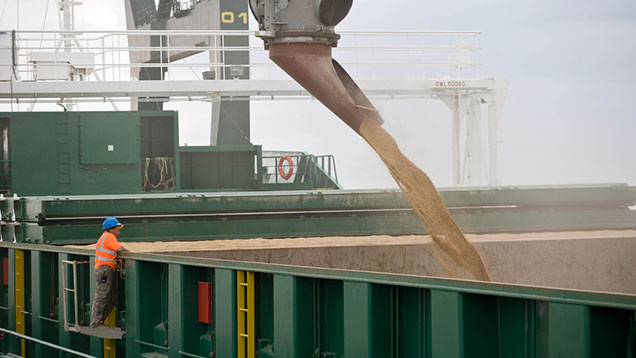Short-term ordering prevails on narrow feed price range
 © Tim Scrivener
© Tim Scrivener Feed and ingredient prices are trading in a narrow range as producers and mills buy hand to mouth.
Supply is generally plentiful and while wheat prices have firmed recently on worries about dry conditions in Russia, Australia and parts of the US, most analysts see little prospect of any big price rise.
With more than 40% of the US soya bean crop harvested, the trade is waiting for a US Department of Agriculture report to update yields later tomorrow (Friday 9 November).
This could lead to some futures market movement, but the 2015 crop looks like being the largest ever.
See also: Farmers stay cautious despite falling feed prices
November will see the first shipments of new-crop soya meal supplies to the UK, with HiPro meal currently offered at £270-£280/t for full loads delivered from November through to April.
Those looking further ahead could book October 2016 deliveries at £267/t, said Phil Garnham of Anglia Farmers.
Rapeseed meal is £176-£195/t for November to December, with the spread having narrowed recently.
There was no huge demand for this through the winter, so spot purchases could prove the best buy, said Mr Garnham. He added that with good supplies of most of the main feeds, currency was likely to be behind most price movements for the winter, while weather shocks could affect 2016 crop prices.
Heat-treated rapeseed and soya meal cost about £45/t and £65/t respectively more than their untreated counterparts, but offered better energy value, said Chris Davidson of KW Alternative Feeds.
Soya hulls have dropped to about £110-£116/t on farm spot, providing some of the cheapest energy.
Mr Davidson urged producers to consider other alternative feeds such as processed bread, which at £82-£95/t provided more starch and protein per pound than rolled wheat.
Sweet starch, a by-product of biscuit and confectionery production, also offered good value at about £125/t, he said.
With plenty of cheaper alternatives about, interest in sugar beet products had reduced, said traders. However, the premium seen on imported material last year has moved to home-produced beet feeds.
This puts home-produced molassed pellets at about £150/t delivered to farm and imported at about £5/t less.
